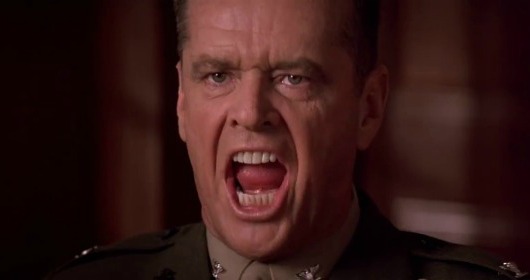And it has the power to get your screenplay tossed, instead of read.
How do you write an effective dialogue, a dialogue that REALLY contributes to your story?
Simple.
Make sure it fulfills these 5 dialogue functions.

We asked the Colonel Jessep from the screenplay "A Few Good Men", written by Aaron Sorkin, to lead us through the 5 movie dialogue functions.
Why? because he's an extraordinary character who uses one or more of these functions every time he speaks.
And he has no issue letting us know the "truth" about what they are and how to use them.
Whatascript!:
Colonel, you covered so far 2 out the 5 movie dialogue functions:
Col. Jessep:
Right. Let's jump now to the third of these 5 movie dialogue functions: communicating information.
There are things I know as a character that I need to let you know, the audience, otherwise you will not follow the plot.
You will not be able to understand what I am doing and what's going on.
We call that exposition.
Whatascript!:
This seems easy to do --
Col. Jessep:
Well, it's not, son.
It's very much like training private Santiago to run and not fall from exhaustion.
The dialogue rule #10 "Fire Bob, his family and friends" talks about exposition and how to deal with it.
The recommendation is to give information through conflict.
This is what I do. This way I keep you interested, it does not look too obvious and you discover new aspects of my character when I deliver this information.
Whatascript!:
Colonel, can you give us some examples?
Col. Jessep:
No problem, son.
There is this scene when I let the audience know about the relationship I have with the late Captain Markinson.
But what you are left with, is not the back story, the background information, no, you are left with the tension between us.
And yet, you get the information, which allows you to better understand why Markinson has difficulty with me.
MARKINSON starts to stand -- JESSEP (continuing) Matthew, siddown. (beat) We go back a while. We went to the Academy together, we were commissioned together, we did our tours in Vietnam together. But I've been promoted up through the chain with greater speed and success than you have. Now if that's a source of tension or embarrassment for you, well, I don't give a shit. We're in the business of saving lives, Captain Markinson. Don't ever question my orders in front of another officer.
It of course reveals my character as well (which is the second of the 5 movie dialogue functions I talked about).
I'll give you another example about giving information.
This time, it is in a scene between the very special Commander Jo Galloway and Lieutnant Kaffee.
Jo moves close to KAFFEE to say this with a degree of confidentiality. JO I do know you. Daniel AlliStair Kaffee, born June 8th, 1964 at Boston Mercy Hospital. Your father's Lionel Kaffee, former Navy Judge Advocate and Attorney General, of the United States, died 1985. You went to Harvard Law on a Navy scholarship, probably because that's what your father wanted you to do, and now you're just treading water for the three years you've gotta serve in the JAG Corps, just kinda layin' low til you can get out and get a real job. And if that's the situation, that's fine, I won't tell anyone. But my feeling is that if this case is handled in the same fast-food, slick-ass, Persian Bazaar manner with which you seem to handle everything else, something's gonna get missed. And I wouldn't be doing my job if I allowed Dawson and Downey to spend any more time in prison than absolutely necessary, because their attorney had pre- determined the path of least resistance.
Whatascript!:
Colonel, in both cases the information is introduced through conflict. Can you give us a more "peaceful" approach?
Col. Jessep:
What's your problem, son?
Story is conflict. Life is conflict. My life is conflict.
I eat breakfast 80 yards away from 4000 Cubans who are trained to kill me.
But alright! I'll give you an example.
This time, it's about creating a situation, that allows you to give information in a natural manner.
I've got a daugher, Skylar. She met this guy, Will something. Absolutely no material for the marines.
He comes from a script written by Matt Damon and Ben Affleck, Good Will Hunting.
She says he's a genius in maths, which I couldn't care less here at Windward base.
The truth is, he's a trouble maker who has that luxury of doing nothing with his life while I stand on the wall of freedom, defending it, day and night.
Anyway, that's what Judge Malone said to this Will character in court after he got arrested for assault. And that's how he communicated backstory information to the audience.
JUDGE MALONE March, '94 public drunkenness, public nudity, assault. 10/94 mayhem. November '94, assault. Jan. '95 impersonating a police officer, mayhem, theft, resisting -- overturned-- The Judge takes a beat. Gives Will a look. JUDGE MALONE You're in my courtroom, now and I am aware of your priors. (beat) I'm also aware that you're an orphan. You've been through several foster homes. The state removed you from three because of serious physical abuse.


You may not realize it but by taking this simple action you
empower us to write more articles like that - one Comment/Like/Share at a time.
Thanks for that.
It's all about Creating conflict between characters.
Pictures and screenplay extracts:
"A Few Good Men" - Jack Nicholson (Colonel Jessep), Tom Cruise (Lt Kaffee); Aaron Sorkin (screenplay), Rob Reiner (director), Robert Richardson (director of photography), Columbia Pictures and Castle Rock Entertainment
Go from 5 movie dialogue functions (part 3) to Home page
* Seven, screenplay written by Andrew Kevin Walker